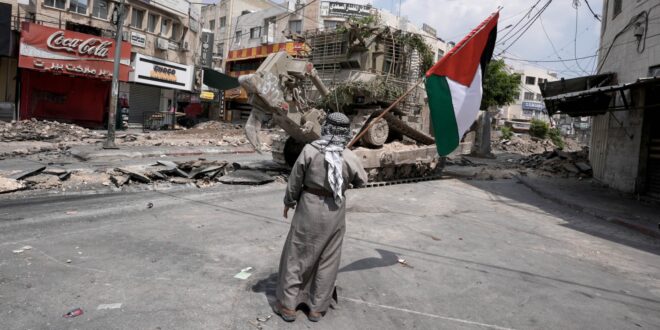In-depth: There are fears that Israel’s military raids in the West Bank, the largest in decades, are fuelled by plans to annex the Palestinian territory.
For more than a week, Israeli forces have raided the Palestinian cities of Jenin, Tubas, and Tulkarem in the occupied West Bank – razing infrastructure, displacing residents, and killing at least 33 people.
While the Israeli military claims the operations are aimed at extinguishing terrorism, Palestinians say the goal is ethnic cleansing.
“The Israeli government has come to settle the whole conflict and put an end to Palestinian independence,” Younes Arar, with the Palestinian Liberation Organisation’s (PLO) Colonisation and Wall Resistance Commission, told The New Arab.
Israel’s ongoing raid is its largest incursion into the occupied territory since the Second Intifada (Palestinian uprising against Israeli occupation) in the early 2000s.
While military raids are a normal part of daily life for Palestinians in the West Bank, this particular attack is longer and bloodier than previous events, says Fayhaa Khanfar, a journalist from Tulkarem.
“Everything that we see now is something we’ve seen many years ago. However, the intensity has increased,” Khanfar said during a 30 August press briefing hosted by Palestinian civil society groups.
Since Hamas’ deadly attack on Israel on 7 October 2023, the Israeli military has carried out near-daily raids into the West Bank – killing more than 600 Palestinians and detaining over 10,000. Al Jazeera correspondent, Nida Ibrahim, estimates the number of raids has “more than tripled” since Israel launched its war on Gaza.
According to a field researcher with Palestinian human rights organisation Al-Haq, the Israeli military hasn’t ordered residents to evacuate but rather made conditions so unliveable that Palestinians in refugee camps, where the attacks are primarily occurring, are forced to flee.
“The terror instilled with the people and the scale of destruction in certain neighbourhoods has pushed the residents practically to leave those areas and to search for – I cannot say safer because there are no safer areas – but maybe calmer areas in comparison with what’s happening inside refugee camps,” Al-Haq’s researcher said during the press conference.
Israel’s war on the West Bank
Experts caution, though, against viewing the situation as existing within a vacuum.
“If we don’t keep in mind that as far as this government is concerned, the grand prize and the ideological commitment is to the West Bank, to annexing it fully, to ethnically cleansing it, then we will miss the point of what is happening,” Palestinian political analyst Nour Odeh told The New Arab.
Looking at the broader context, the current military raids should be understood alongside the expulsion of Palestinians in Israeli-military-controlled Area C of the West Bank and recent Israeli policy changes to the territory.
In the last year, Palestinian herding communities in the West Bank have experienced mass displacement due to intensifying settler violence, repeated demolitions, and shrinking access to grazing land.
According to the United Nations, 2023 had the highest recorded rate of Palestinian displacement in a single year, with roughly 4,000 Palestinians leaving their homes.
From creeping to formal annexation
As state and settler attacks increase on the ground, the Israeli government is also seeking to change the facts. In June, Israel declared nearly 13 square kilometres of the Jordan Valley as state land, marking the largest seizure of Palestinian land since the 1993 Oslo peace agreement between the Palestinian Authority (PA) and Israel.
According to the Israeli settlement watchdog, Peace Now, 2024 has become a peak year for land theft in the occupied territory.
The massive land grab came out of Hillel Roth’s recent appointment as a civilian deputy in Israel’s Civilian Administration, the military body overseeing the West Bank, which transferred the management of civilian life in the West Bank from the military to far-right minister Bezalel Smotrich’s Settlements Administration.
The move is largely seen as Israel officially annexing the West Bank.
“The end goal is formal annexation,” Palestinian-Dutch analyst Mouin Rabbani told TNA. While he notes that the expulsion of Palestinians isn’t the explicit aim, it is a tactic as part of the larger objective of annexing the West Bank to Israel.
“The current Israeli government has repeatedly and openly been saying for years they want to create conditions to make life in the West Bank intolerable for its Palestinian population,” Rabbani added.
As Israeli right-wing calls to reoccupy Gaza transform from fringe to mainstream, the international community may be missing that the West Bank is at the heart of Israel’s maximalist agenda. While there’s debate over whether the Gaza Strip is part of the Zionist vision for Israel, the West Bank is without question.
In a graphic presentation this week, Israeli Prime Minister Benjamin Netanyahu made the case for why Israel shouldn’t withdraw from the Philadelphi Corridor in the Gaza Strip.
Yet his map glaringly omitted the Green Line – separating the West Bank from Israel – signalling that the leader’s plans don’t just include Gaza colonisation but West Bank annexation as well.
“Everybody seems to have forgotten that Netanyahu’s coalition platform is about annexation,” Odeh said. “It’s not a secret. It is the declared government program.”
And as the Israeli state – without accountability – implements its expansionist plans, Arar laments the fate of Palestinians.
“The Israeli government is giving Palestinians three choices: death, displacement, or accept being enslaved.”
 Eurasia Press & News
Eurasia Press & News

